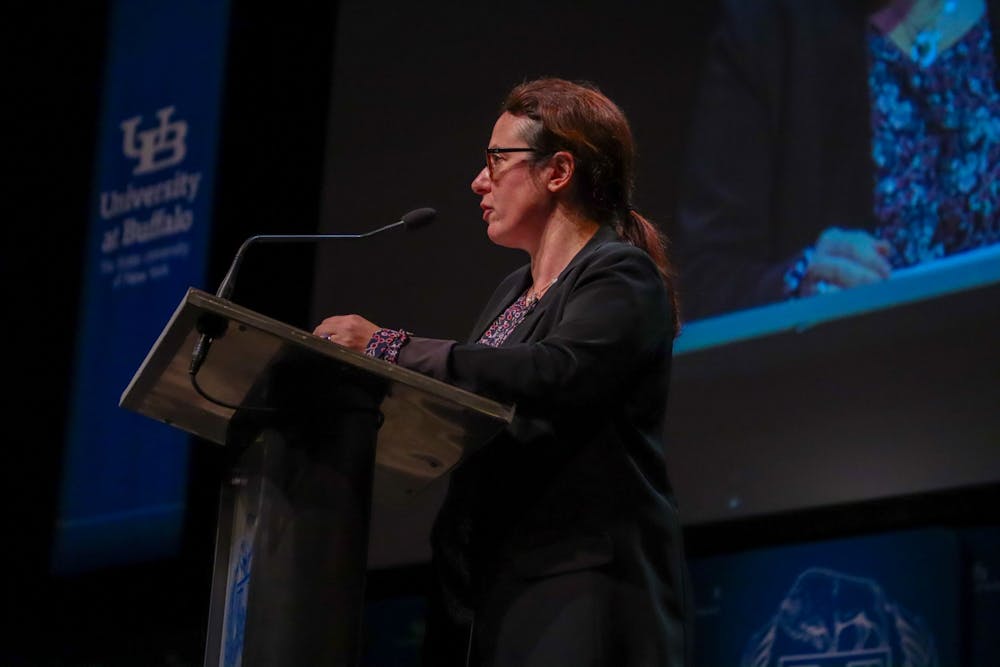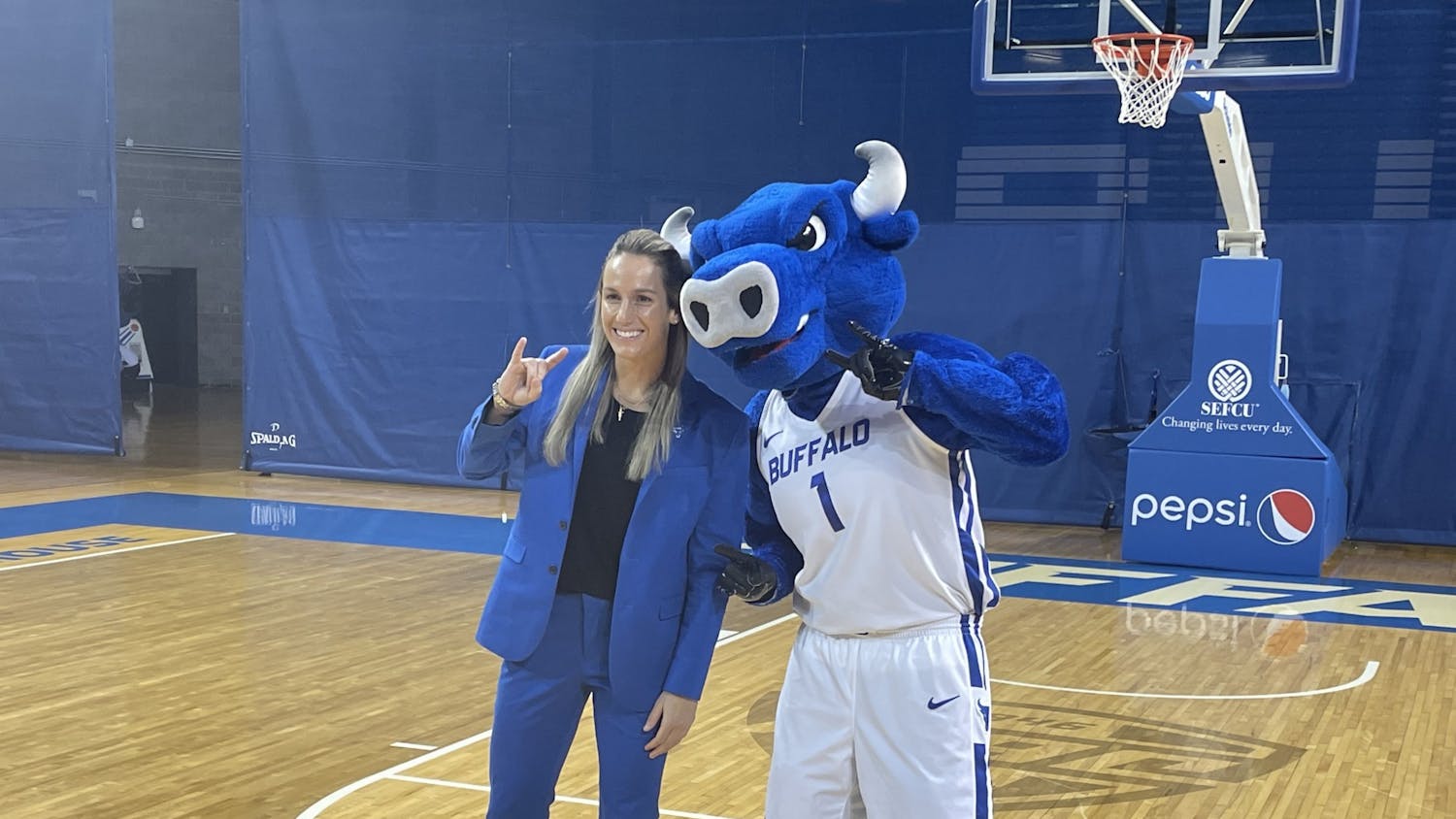Maggie Haberman said she had a “fairly traditional career” before Donald Trump’s presidency.
And while she’s since been “attacked” by Trump and often faces the “corrosive effects” of fake news rhetoric, she still says her job is “amazing.”
Haberman was the second guest of UB’s 33rd annual Distinguished Speakers Series. The White House correspondent for the New York Times and political analyst for CNN won a Pulitzer Prize in 2018 for coverage of Trump’s advisers’ connections with Russia. In her speech Thursday, Haberman discussed her experiences covering Trump, the current state of U.S. politics and how journalism has changed during her time as a reporter. The event ended with a Q&A session led by Ann Bisantz, dean of undergraduate education.
Haberman said Trump “has thrown accelerant on the era of partisan polarization, but he by no means created it.” She referenced Bill Clinton’s presidency, Supreme Court case Bush v. Gore, Sept. 11, the wars in the Middle East and the 2008 fiscal crisis leading up to this.
“These are seismic events in the life of a nation,” Haberman said. “We did not arrive in this moment of history out of nowhere.”
And neither did she.
In 2011, Haberman received a tip from Roger Stone, a political consultant and lobbyist, about a potential Trump campaign. She ran with the story, then received a call from Trump who said Stone didn’t speak for him and a statement from Trump’s office saying Stone wasn’t advising him.
“It was an early window into the disorienting sensation that has become familiar with journalists seeking to cover reality during the Trump presidency,” Haberman said.
Haberman said Stone warned her that “the line between news and entertainment was not quite as clear for people outside of the business.” She said this became evident when people described Trump as a “self-made man” and “successful business leader” despite contradicting evidence the New York Times provided about his career.
“It did not penetrate the already-formed opinions that many people have of him, watching him on television and seeing him sit in a high-back leather chair,” Haberman said.
Haberman recalled the day after Trump’s election, when a “democratic strategist” told her “the nation was about to discover how much of its system is based on norms, not laws.”
“And he was right,” Haberman said.
This story resonated with Philip Gambini, a Niagara Gazette reporter.
“Being ethical and being moral isn’t always synonymous with what’s legal,” Gambini said. “You could be immoral and not necessarily commit a crime, but that doesn’t make it not worth knowing about or not worth being critical of.”
Haberman said Trump’s tweets are not “a real-time window into his thinking” but are often part of his persona.
“The Twitter persona that he has is sometimes just that –– a persona. So what can be striking to people is that when they meet him, he comes off different than what ends up becoming a caricature of him, in terms of his personal interactions,” Haberman said. “He does have a temper, he does get angry and he vents quite frequently with his aids and then he moves on.”
Haberman said journalism has turned into a “choose your own adventure” model.
“For our credibility, it’s vital to take the time to determine what is real and what is not. Even if it means losing a scoop or a story,” Haberman said. “No one will ever remember who got certain stories right, but they will certainly remember who got them wrong.”
She discussed the importance of local journalists as “vital sources of accountability” and said following the news on Twitter is “not healthy and it’s not informative.”
But she never thought she would be writing news. Haberman said she “always wanted” to write but “never wanted to be a reporter.” Her father was a journalist for the New York Times and she “saw firsthand how hard it can be on families.” But after graduating from college, she struggled to find a job and applied to the New York Post as a “copy kid,” where she had her first experiences reporting.
Adwoa Dadzie, a junior biological sciences major, said this was encouraging.
“Just how she entered her career without even knowing she was entering her career … especially for students who don’t know what is going to happen to their career … it’s important to see that you don’t always go in the direction that you are expecting to go,” Dadzie said.
Haberman’s speech left audience members with her inside perspective on Trump, Twitter and the state of the news media, despite technical difficulties during Vice President of Research and Economic Development Venu Govindaraju’s introduction, where closed captions confused Haberman’s Pulitzer Prize with “Punxsutawney Phil.” Shortly after Haberman began speaking, closed captions ended for inability to keep up.
But early technical difficulties didn’t stop Haberman from leaving the audience with a harrowing warning:
“All we can be sure of is that 2020 is going to make the nastiness of 2016 look like a high-minded debate of ideas.”
The news desk can be reached at news@ubspectrum.com.

Jacklyn Walters is a senior communication major and The Spectrum's managing editor. She enjoys bringing up politics at the dinner table and seeing dogs on campus.

Alexandra Moyen is the senior features editor of The Spectrum.





